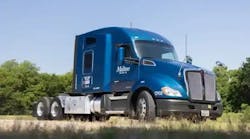According to a report released by the National Chamber Foundation, an affiliate of the U.S. Chamber of Commerce, the Highway Trust Fund will be bankrupt by 2008 unless the government draws new revenues.
The report comes just four months after President George W. Bush signed the massive $286-billion highway reauthorization bill.
According to the report, to maintain current transportation system conditions through 2030 a funding shortfall of a half trillion dollars must be addressed.
“The problem is that [the government] took the rosiest, most optimist projections of revenues and of SAFETEA-LU [the recent highway bill], and the numbers aren’t what they hoped it will be,” Brian Deery, senior director of highway and transportation division for the Associated General Contractors of America (AGC) told FleetOwner. “It’s also because there was no reauthorization in the first two years after the expiration of the previous highway bill. Congress has dwindled down the trust fund.”
Deery still describes the highway bill that passed in August as a good bill. “But they really didn’t step up to the plate and do something about the revenue,” he stated.
AGC is calling for indexing the gas tax to inflation to prevent the highway fund from eroding as a short-term solution until long-term solutions to supplement the fuel tax are established.
“The release of today’s report is the first step in the long process of reauthorizing the surface transportation program,” said AGC CEO Stephen E. Sandherr. “It includes thoughtful and bold recommendations, and it is now our job to convince leaders to lead.
“Without a significant influx of new revenues, not only will the HTF be unable to support the federal commitment made under SAFETEA-LU, but our nation’s transportation network will also continue to deteriorate, impacting mobility and economic well-being,” added Sandherr.
“My feeling is that we are potentially entering a very difficult time for paying for the roads we drive,” Greg Cohen, president of the American Highway Users Alliance told FleetOwner. “At the same time, we have tremendous revenues from truckers and motorists that are not being spent on what these taxpayers use. It’s time to reevaluate the situation—how much are we collecting, what are our needs, and how specifically are we adding up these needs.”
To view the report, titled Future Highway and Transportation Finance, go to www.uschamber.com/ncf/default.


